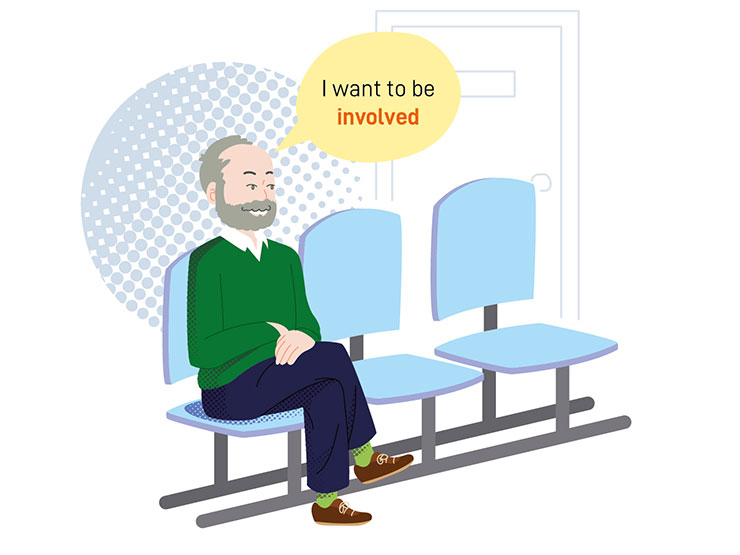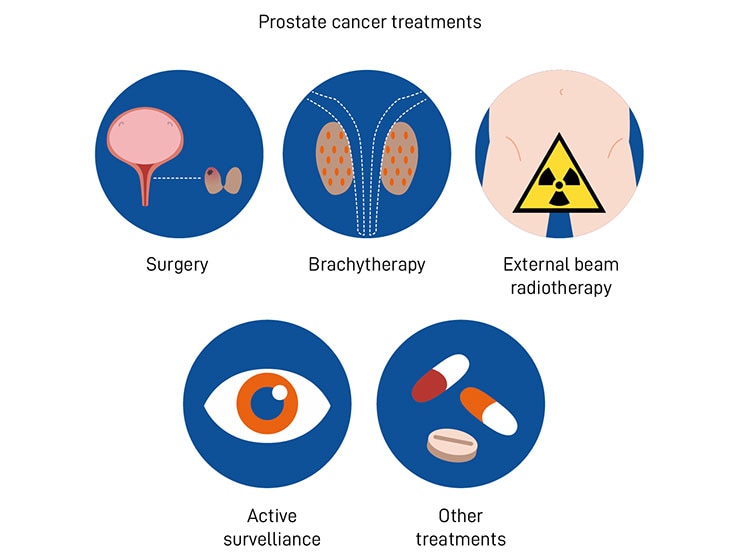
Treating prostate cancer
How is prostate cancer treated?

There are many options to treat prostate cancer.
- The extension of your cancer, such as if it has spread beyond the prostate gland, N+, M?
- The aggressiveness of your cancer
- The scale of your prostate gland
- Your general wellbeing,
- urinary problems or not
- your preferences if different treatment is possible

The Decision is Yours!
During a dedicated appointment, the doctor will explain the chosen treatment plan, the anticipated benefits, and any potential side effects*.
You should be offered the opportunity to meet a doctor of each speciality (ideally a urologist and a radiation oncologist, sometimes a specialist nurse also). This is your chance to talk to the different doctors before expressing your opinion. Several choices are often available because different treatments achieve similar disease control, but with diverse secondary effects. You should be informed of your options for salvage treatment if a relapse occurs.
Note that you have the final word on the treatment options after consulting with the medical team. This discussion is crucial. It is often beneficial to be supported by someone you trust.
Write down all your questions before the appointment and take time to ask each of them to your doctor. This conversation will help you better understanding and integrating the information provided by the doctor, allowing you to make informed decisions that are adapted to your specific situation.

Depending on the characteristics of your prostate cancer, it may be treated in a variety of ways. Several modalities, alone or in combination, may be proposed:
- Active surveillance
- Brachytherapy
- External beam radiotherapy
- Hormone therapy
- Surgery
- Cryotherapy
- Watchful waiting (only for old men)

Depending on the situation, the goal(s) may include:
- monitoring the evolution of the disease to delay treatment and its potential sides effects with the possibility that you might never need a treatment due to slow growth of cancer.
- suppressing or reducing the tumour* and/or metastases*.
- lowering the risk of recurrence*.
- stopping the progression of the tumour or metastases.
- treating the disease's symptoms for the best possible quality of life.
Who will be involved in my care?
Throughout the duration of your illness, you will encounter or be in contact with a variety of specialists, whether in the hospital where you are being treated or in the community. From the diagnosis of the disease to the follow-up after treatment, these health care professionals are focusing on your care.
In Diagnosis
The urologist is a doctor specialized in male and female urinary and male genital problems. He is involved in the diagnosis, monitoring, surgical and medical treatment, and follow-up of prostate cancer. He is the one responsible for removing the tumour
The radiation oncologist or radiotherapist is a doctor specialized in the treatment of cancers with radiation that destroys the cancer cells locally (radiotherapy). In collaboration with an expert team that includes a physicist and a dosimetrist, the radiation oncologist prescribes the dose of radiation needed to treat the tumour (external radiotherapy and/or brachytherapy), identifies the areas to be treated and those to be protected, and plans the radiotherapy sessions. These are carried out by a team of radiation therapist. Regular consultations allow the radiation oncologist to check that the treatment is going well and to prescribe medication to treat any adverse effects. When the radiation oncologist is specialised in brachytherapy, he is sometimes called a brachytherapist.
The oncologist, or cancer specialist, is a doctor who is specialized in cancer and its treatment. He may be a chemotherapy specialist (medical oncologist), a radiotherapy specialist (radiation oncologist), an organ specialist (pneumologist, hepatogastroenterologist, neurologist, etc.) or a surgeon specialized in cancer (urologist, etc.).
The pathologist is a doctor who examines the cells and tissues taken during a biopsy or surgery, under a microscope. His role is instrumental for the diagnosis and choice of upcoming treatments during the Multidisciplinary team meetings (MDT).
The radiologist is a doctor who interprets images of the body or organs taken during radiology exam, such as X-ray, a scanner, or an ultrasound scan. Thanks to medical imaging techniques, he or she can perform minimally invasive medical procedures for diagnostic or therapeutic purposes. This is known as interventional radiology. He is assisted by a radiology technician.
In Surgery
The anaesthetist is a doctor who puts you to sleep or numbs you during a surgical procedure. Before the procedure, he meets you to assess the most appropriate anaesthetic technique. During the procedure, the anaesthetist performs and monitors the anaesthesia. He or she will then follow you up in the recovery room and treat any pain. The anaesthetist may also place a port.
A surgeon is a doctor who performs surgical procedures to, for example, diagnose cancer, remove tumours, affected tissues or organs, ensure the correct functioning of an organ, remedy certain complications or improve the appearance of the operated area. He or she may also perform implantable chamber placement.
In Post Surgery
The state-qualified nurse (SRN) is responsible for carrying out care and monitoring as well as administering the treatments prescribed by the doctor. He/she ensures the comfort and hygiene of the person being cared for and has a role of information, prevention, health education and monitoring of patients. He/she works in a health care institution or as a private practitioner.
The physiotherapist or masseur-physiotherapist helps to re-educate different parts of the body through appropriate movements and massage. On medical prescription, the masseur-physiotherapist performs acts manually or with the help of equipment, and teaches you gestures or techniques that allow you to remedy your deficits.
The general practitioner follows your various health problems in a global medical and medico-social approach. He coordinates the local players (nurse, physiotherapist, etc.). In the case of cancer, he has a very important role to play in prevention, screening and diagnosis, during treatment and during follow-up after treatment. He is in contact with the hospital or clinic by telephone, reports and medical correspondence. He or she is usually chosen as the treating physician. If necessary, he or she will also accompany your family and friends.
Support
The psychologist is a professional who specialises in listening and is trained to help people in situations of psychological suffering. They can provide psychological support and follow-up through individual or group sessions
Treatment types
Contact Support
